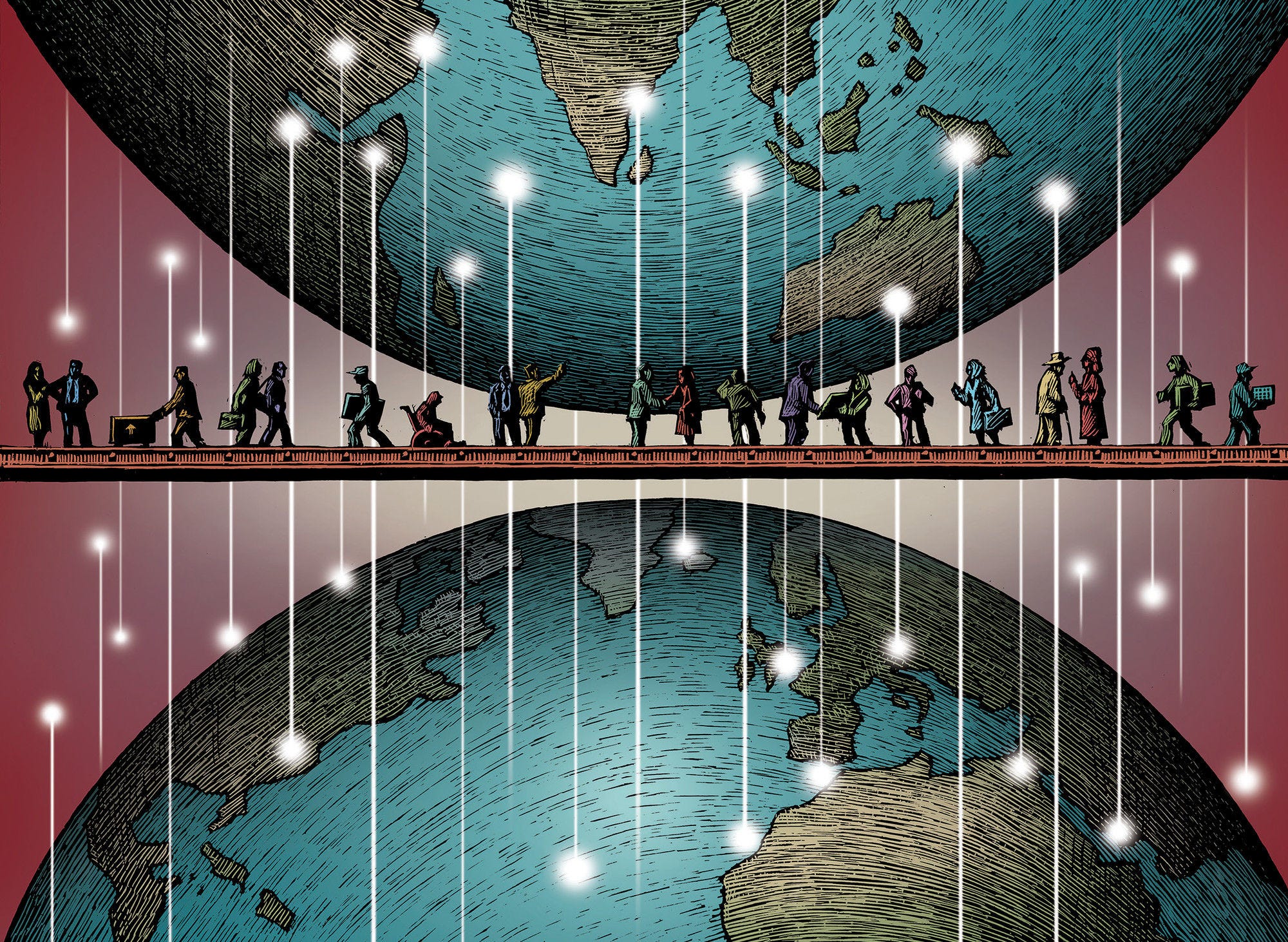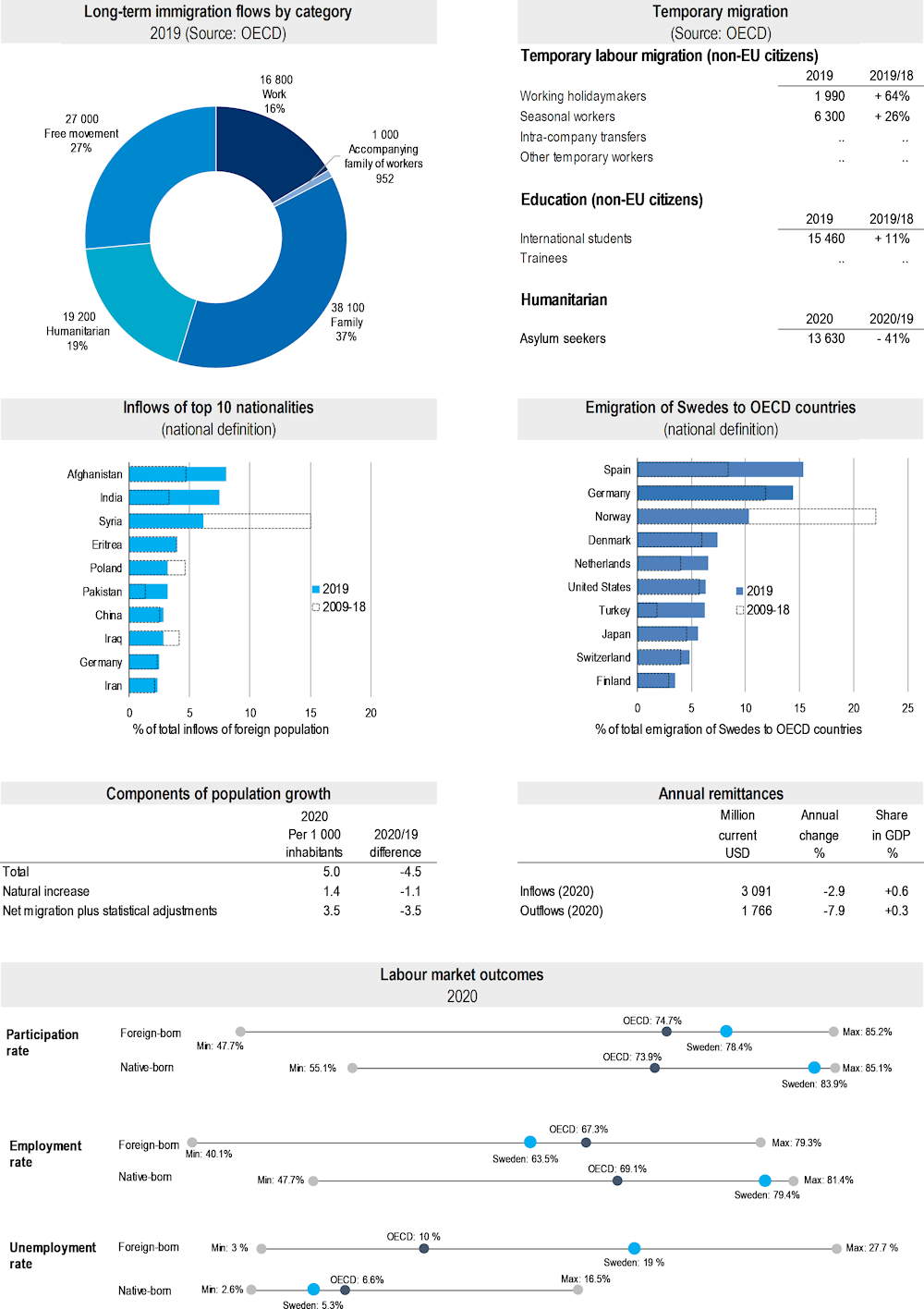In 2019, Sweden received 102 000 new immigrants on a long-term or permanent basis (including changes of status and free mobility), ‑17.5% compared to 2018. This figure comprises 26.5% immigrants benefitting from free mobility, 16.4% labour migrants, 38.3% family members (including accompanying family) and 18.8% humanitarian migrants. Around 15 000 permits were issued to tertiary-level international students and 8 300 to temporary and seasonal labour migrants (excluding intra-EU migration). In addition, 85 000 intra-EU postings were recorded in 2019, an increase of 59% compared to 2018. These posted workers are generally on short-term contracts.
Afghanistan, India and Syria were the top three nationalities of newcomers in 2019. Among the top 15 countries of origin, Pakistan registered the strongest increase (700) and Syria the largest decrease (‑7 900) in flows to Sweden compared to the previous year.
In 2020, the number of first asylum applicants decreased by ‑41.1%, to reach around 14 000. The majority of applicants came from Syria (1 800), Uzbekistan (700) and Ukraine (500). The largest increase since 2019 concerned nationals of Afghanistan (100) and the largest decrease nationals of Syria (‑3 300). Of the 17 000 decisions taken in 2020, 25.7% were positive.
Emigration of Swedes to OECD countries increased by 5% in 2019, to 18 000. Approximately 17% of this group migrated to Spain, 11% to Norway and 9% to Germany.
In 2016, the Swedish Parliament passed an act to temporarily restrict the possibility to obtain resident permits in Sweden, which has been prolonged until 19 July 2021. Under the Aliens Act entering into force on 20 July 2021, residence permits will, as a rule, be time‑limited. Permanent residence permits will be granted only after having had a temporary residence permit for at least three years and if certain special requirements are met.
In February 2020, the Swedish Government established an inquiry to propose a new residence permit for highly-skilled third-country nationals who seek to find employment or create a business in Sweden. The inquiry will also present legislation to avoid labour migrants being expelled due to minor deviations from requirements and measures to prevent exploitation of foreign workers.
In April 2020, the government appointed an inquiry to make a review of the regulatory system concerning expulsion on account of criminal offences. The purpose has been to draft a tighter regime making it possible to expel aliens who commit criminal offences in more cases than present. The committee will present its report in June 2021.
The government increased funding to the Migration Agency to provide more information about Swedish society to asylum seekers, in addition to the information already provided by the Agency. This includes education on issues related t o democracy, rights and obligations. The government also provides permanent funding for the national website “Information Sverige” to meet information needs of newly arrived immigrants.
In 2019, the need for a clear gender perspective in all measures within the integration programme was included as an assignment in the appropriation warrant of the Swedish Public Employment Service for 2019 and was extended to 2020.
Preparations for Entry Agreements have been ongoing over the past year and Entry Agreements are planned to be introduced during 2021. These agreements constitute a new strategy for getting long-term unemployed and newly arrived immigrants into the labour market and facilitate skills supply for Swedish employers.
Due to the pandemic, the government decided to restrict non-essential travel to Sweden from countries outside the EU/EEA until 31 August 2021. The government also adopted a separate entry-ban on travel to Sweden from EU/EEA and some other countries until 31 August 2021. This entails an entry-ban on travel to Sweden without a vaccination certificate, a negative COVID‑19 test result, a certificate confirming recovery from COVID‑19 or a corresponding certificate can be presented. There are exemptions from the entry bans for various categories of travellers. Entry from Denmark, Finland, Iceland and Norway is not subject to entry restrictions. In May 2021 the Government once again decided to reintroduce border control at the Schengen-internal border. Such border checks have been in place since 2015 and the current decision is in force until 11 November 2021.
The Swedish Government adopted a high number of labour market policy changes during 2020 to mitigate the economic impacts of the pandemic, including measures for newly arrived immigrants. The measures contain temporary reinforcement of the unemployment insurance, increased funds for the Public Employment Service and active labour market policy measures as well as funds for summer jobs for youth.
For further information:

